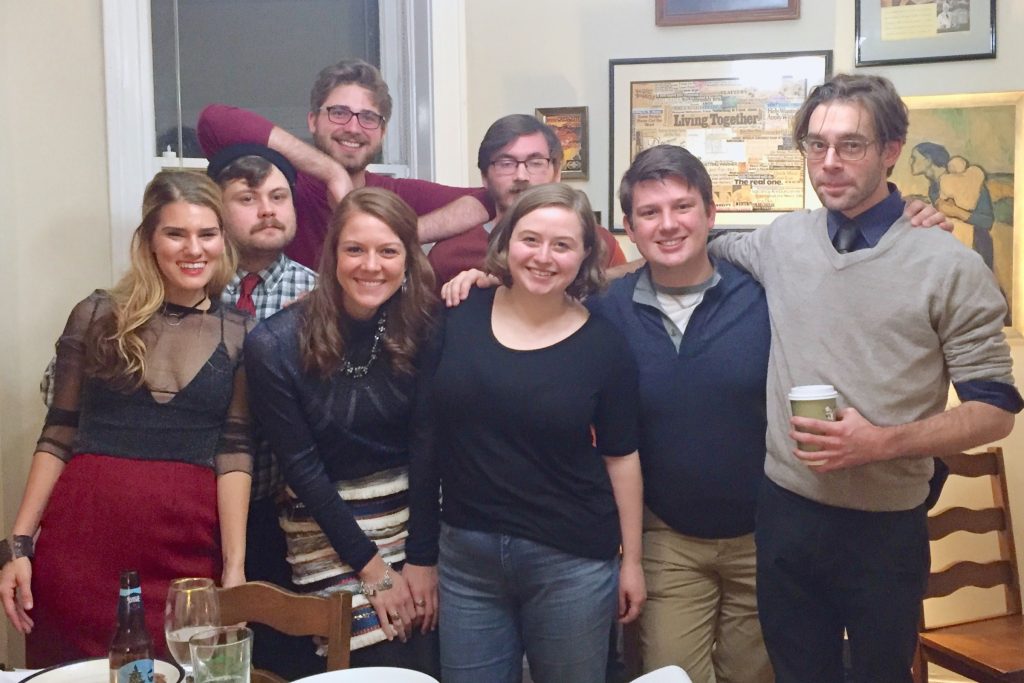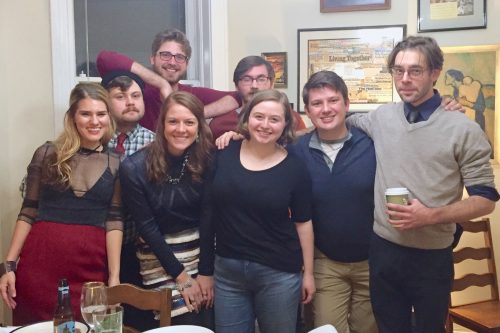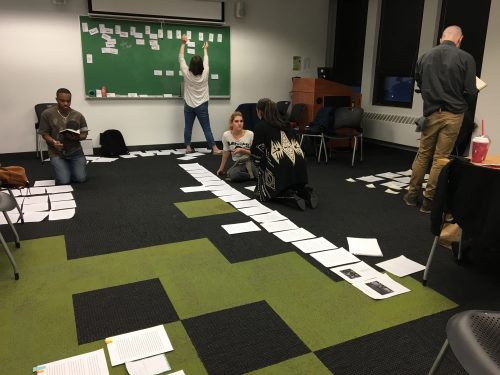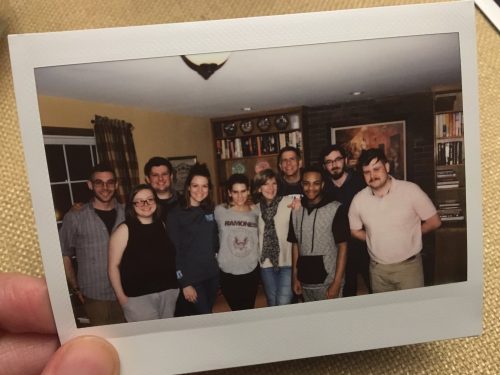
Sentimentality Lane
I just completed my fourth semester at Columbia. It could be considered my final semester, since the Fall will just be me working on my thesis, without attending classes. Like I said in my last post, I’m about to get retrospective and sentimental about my time in this program. And since you’ve all heard from me over the past few months, I thought I’d recruit my some of my cohort to join in.
More than the engaging course structures, more than the established professors, more than the awesome opportunities offered by being a student here, Columbia has a magical knack for accepting the right types of people for this program. I knew this on a personal level, but when I asked my cohort to give me a few of their insights about what they’ve experienced over these past two years, I realized it was more than just an opinion.

Fiction Cohort Dinner Winter 2016. Not pictured: Tyrell
Neal Steichen says: “As much as I thought that graduate school would be a chance for me to isolate myself to really work on myself and my craft, the most valuable work I’ve made has come from working closely with excellent faculty and, possibly more unexpected, my phenomenal cohort.”
Tyrell Collins credits both the city and the community: “As a non-native of Chicago, I thought it would be just another grandeur place like NYC where I would feel lost and struggle for a sense of belonging. I was glad I was wrong in that Chicago, Columbia, my cohort, and faculty have inspired and challenged my writing in ways that I will treasure always. The bond and experience is truly a once in a lifetime opportunity. And being at Columbia and with my cohort has taught me that I have stories to tell a voice to share with the world.”
Edward Patrick Huycke dug down deep to describe his time here: “The opportunity to spend two years with eight incredible writers and beautiful human beings, as their work evolved and their ups downed and downs upped. To be welcomed into the lives and work of Sara, Neal, Paul, Alex, Tyrell, Tom, John, and Kate kept me lacing my shoes up each morning when little else in the world did the trick. The sheer amount of time we spent together, often in confounded silence under the tsunami of work that was always yet to be done, darting our eyes at each other then at the floor, then out the window at the darkening skyline of this city none of us are from as if to say, ‘What have we gotten ourselves into?’ And instead of gnash our teeth and growl at each other, we stuck together the best we could, and by the time it was over there was a strange, neurotic, occasionally agonizing family as strong (maybe stronger) than anything else I’ve ever been or ever will be a part of, brothers and sisters I love a whole lot. Two years ago I didn’t think any of that had anything to do with my work. Now it’s what keeps my writing and myself as authentic as possible and that’s the only thing that matters.”

Working on Thesis layout with Professor Alexis Pride
Kate Wisel found herself part of a group with common passions: “Before the program, I always felt like a freak because I really loved to do this thing that no one else I knew loved to do as well, at least not people in my everyday life. And though I’m still a freak, I’m a freak among other freaks who know what it’s like to love something as much as I do and to labor over it and to, day after day, just try to become better. And we’ve all gotten better, all of us, because we’ve all wanted to. And that bond is so unique. To have witnessed all of their growth like they’ve witnessed mine has been the highlight of my life.”
Alexandra Stanislaw-Bennett realizes she’ll always have us with her: “I believed coming into an MFA program that community was key to my success and overall happiness with whatever program I chose. And the community I found at Columbia proved this. My writing wouldn’t be what it is without their voices in my head and their continued support.”
John Stadelman is glad to have waded through the murky waters and ended up somewhere he’s proud to be: “Even though the constant work and deadlines have been a pain in the a**, like all schooling can be, they’ve helped improve my ability to handle multiple tasks at once. Confidence in my writing, who/what kind of writer I want to be, what in the general hell I’m doing, all of that has been strengthened by the cohort, and by improving as a writer alongside eight other writers. Didn’t quite know what to expect going in, but I couldn’t have asked for a better place to be as a writer 4 semesters later.”

Spring Break 2017 in Boston. Not pictured: Paul. (ft. Mr. & Mrs. Wisel)
As for me, I’m gonna go with, “What they said.”
Fiction MFA Class of 2018, signing out. Catch us in the real world…
